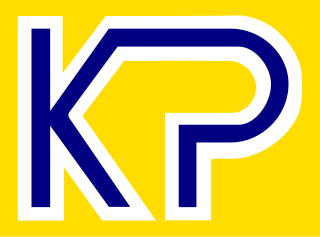Related Research Articles

Afrikaner Calvinism is a cultural and religious development among Afrikaners that combined elements of seventeenth-century Calvinist doctrine with a "chosen people" ideology based in the Bible. It had origins in ideas espoused in the Old Testament of the Jews as the chosen people.

The Orange River Colony was the British colony created after Britain first occupied (1900) and then annexed (1902) the independent Orange Free State in the Second Boer War. The colony ceased to exist in 1910, when it was absorbed into the Union of South Africa as the Orange Free State Province.

The Ossewabrandwag (OB) was a pro-Nazi Afrikaner nationalist organization with strong ties to National Socialism, founded in South Africa in Bloemfontein on 4 February 1939. The organization was strongly opposed to South African participation in World War II, and vocally supportive of Nazi Germany. OB carried out a campaign of sabotage against state infrastructure, resulting in a government crackdown. The unpopularity of that crackdown has been proposed as a contributing factor to the victory of the National Party in the 1948 South African general election and the rise of apartheid.

The governor-general of the Union of South Africa was the highest state official in the Union of South Africa between 1910 and 1961. The Union of South Africa was founded as a self-governing Dominion of the British Empire in 1910 and the office of governor-general was established as the representative of the monarch of South Africa. Fifty-one years later, the country declared itself a republic and the office of governor-general was abolished.

The National Party, also known as the Nationalist Party, was a political party in South Africa from 1914 to 1997, which was responsible for the implementation of apartheid rule. The party was an Afrikaner ethnic nationalist party, which initially promoted the interests of Afrikaners but later became a stalwart promoter and enactor of white supremacy, for which it is best known. It first became the governing party of the country in 1924. It merged with its rival, the SAP, during the Great Depression, and a splinter faction became the official opposition during World War II and returned to power. With the National Party governing South Africa from 4 June 1948 until 9 May 1994, the country for the bulk of this time was only a de jure or partial democracy, as from 1958 onwards non-white people were barred from voting. In 1990, it began to style itself as simply a South African civic nationalist party, and after the fall of apartheid in 1994, attempted to become a moderate conservative one. The party's reputation was damaged irreparably by perpetrating apartheid, and it rebranded itself as the New National Party in 1997 before eventually dissolving in 2005.

The Afrikaner Broederbond (AB) or simply the Broederbond was an exclusively Afrikaner Calvinist and male secret society in South Africa dedicated to the advancement of the Afrikaner people. It was founded by H. J. Klopper, H. W. van der Merwe, D. H. C. du Plessis and the Rev. Jozua Naudé in 1918 as Jong Zuid Afrika until 1920, when it was renamed the Broederbond. Its influence within South African political and social life came to a climax with the 1948-1994 rule of the white supremacist National Party and its policy of apartheid, which was largely developed and implemented by Broederbond members. Between 1948 and 1994, many prominent figures of Afrikaner political, cultural, and religious life, including every leader of the South African government, were members of the Afrikaner Broederbond.

The Conservative Party was a far-right South African political party that sought to preserve many aspects of apartheid in the system's final decade, and formed the official opposition in the white-only House of Assembly in the last seven years of minority rule. It declined quickly after apartheid ended, before being merged with the Freedom Front in 2004.

Ernest George Jansen was the penultimate Governor-General of the Union of South Africa, holding office from 1951 until his death in 1959.

The Afrikaner Weerstandsbeweging, commonly known by its abbreviation AWB, is an Afrikaner nationalist, white supremacist, and neo-Nazi political party in South Africa. Since its founding in 1973 by Eugène Terre'Blanche and six other far-right Afrikaners, it has been dedicated to secessionist Afrikaner nationalism and the creation of an independent Boer-Afrikaner republic or "Volkstaat/Boerestaat" in part of South Africa. During bilateral negotiations to end apartheid in the early 1990s, the organisation terrorised and killed black South Africans.

From 1910 to 1961 the Union of South Africa was a self-governing country that shared a monarch with the United Kingdom and other Dominions of the British Empire. The monarch's constitutional roles were mostly delegated to the Governor-General of the Union of South Africa.

A referendum on becoming a republic was held in South Africa on 5 October 1960. The Afrikaner-dominated right-wing National Party, which had come to power in 1948, was avowedly republican and regarded the position of Queen Elizabeth II as the South African monarch as a relic of British imperialism. The National Party government subsequently organised the referendum on whether the then Union of South Africa should become a republic. The vote, which was restricted to whites—the first such national election in the union—was narrowly approved by 52.29% of the voters. The Republic of South Africa was constituted on 31 May 1961.

The Herstigte Nasionale Party is a South African political party which was formed as a far-right splinter group of the now defunct National Party in 1969. The party name was commonly abbreviated as HNP, evoking the Herenigde Nasionale Party, although colloquially they were also known as the Herstigtes. The party is, unlike other splinter factions from the National Party, still active but politically irrelevant.

A Volkstaat, also called a Boerestaat, is a proposed White homeland for Afrikaners within the borders of South Africa, most commonly proposed as a fully independent Boer/Afrikaner nation. The proposed state would exclude Afrikaans-speaking Coloureds but accept South Africans of English ancestry and other White South Africans, if they accept Afrikaner culture and customs.

Het Volk was a Transvaal political party, established in May 1904 under the leadership of Louis Botha and his deputy Jan Smuts.
Afrikaner nationalism is an ethnic nationalistic political ideology created by Afrikaners residing in Southern Africa during the Victorian era. The ideology was developed in response to the significant events in Afrikaner history such as the Great Trek, the First and Second Boer Wars and the resulting anti-British sentiment and Anti-communism that developed among Afrikaners and opposition to South Africa's entry into World War I.

Afrikaners are a Southern African ethnic group descended from predominantly Dutch settlers first arriving at the Cape of Good Hope in 1652. Until 1994, they dominated South Africa's politics as well as the country's commercial agricultural sector.
The Afrikaner Bond was founded as an anti-imperialist political party in 19th century southern Africa. While its origins were largely in the Orange Free State, it came to have a significant presence across the region, and especially in the Cape Colony and the Transvaal.

The South African Party was a political party in Cape Colony.
The Dominion Party was a South African political party establish in late October 1934 by dissatisfied members of the South African Party when that party fused with the National Party to form the United National South African Party, commonly referred to as the "United Party".
Die Spoorbond was an Afrikaner railway trade-union formed in 1934 by H. J. Klopper, founder of the Afrikaner Broederbond, which advocated a policy of replacing all black railway-workers with Afrikaners. It rejected strikes and called instead for loyal service to the South African Railways and Harbours Administration (SARHA). The union had a membership of some 16,000 in the 1930s, considerably more than that of its rival, the National Union of Railway and Harbour Servants, which was forced to dissolve in 1937.
References
- ↑ Kiloh, Margaret; Sibeko, Archie (2000). A Fighting Union. Randburg: Ravan Press. p. 11. ISBN 0869755277.